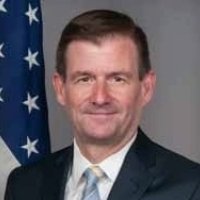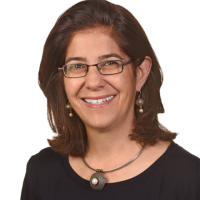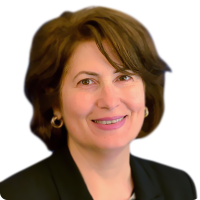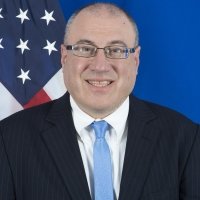Building Lebanon's Sovereignty and the State
Submit a question
This conference represented the culmination of a year of research, convening and dialogue of the Lebanon Ideas Forum, a Wilson Center platform dedicated to fostering the exchange of ideas and facilitating discussions on Lebanon's political, economic, and social developments, as well as their impact on the Middle East region and beyond. The Middle East Program hosted a diverse group of esteemed experts, policymakers, and diplomats from the United States and Lebanon to engage in discussions concerning the intricacies of US-Lebanon relations and viable solutions to Lebanon's enduring crises. Global Fellow Ambassador David Hale presented a comprehensive white paper, Building Lebanon's Sovereignty and the State, on Lebanon covering three key areas: political development, the reconstruction of its economy, and the role of the United States and the international community in supporting Lebanon.
Selected Quotes
Ethan Goldrich, Deputy Assistant Secretary, Bureau of Near Eastern Affairs, U.S. Department of State
“Over the past decade, U.S. foreign policy regarding Lebanon has sought to limit the threats posed by malign actors, bolster Lebanon’s ability to protect its borders, and build a state capacity to deal with the compounding crises facing the country, including the current economic crisis. Fundamentally, this economic crisis was created by a system of corruption and mismanagement that has plagued Lebanon for decades.”
Darin LaHood, U.S. House Representative (IL-16th District)
“While I do not believe that Congress or the administration should consider withdrawing support for the LAF [Lebanese Armed Forces] or humanitarian support, we should be considering robust actions on serious measures, including a real discussion on the issue of sanctions and Magnitsky Act focused on those who continue to subvert the constitutional proceeding of the government... I believe that the United States continues to have a vital national interest in a stable, sovereign and independent Lebanon. But unfortunately issues like the presidential vacancy stand in the way of substantive cooperation.”
Marwan Hamade, Member of Parliament, Lebanon
“Sovereignty is the key to reform, and reform the gateway to redeeming the Lebanese state. Evading this equation through electing the wrong president or launching a distorted debate will perpetuate the whole deal and in the worst scenario, lead to the implosion or the explosion of the 103-year-old republic.”
Dr. Majed Al-Ansari, Advisor to the Prime Minister & Minister of Foreign Affairs, Spokesperson for the Ministry of Foreign Affairs, State of Qatar
“What makes the Doha meeting different from others? One of the main issues there is the highlight of supporting Lebanon’s stability and reform through technical assistance and agreeing on the concepts of joint international action. Because one of the main challenges, as we know in Lebanon, was what was deemed to be a proxy infighting that is happening in Lebanon through countries like Iran, and other regional players that certainly puts more fuel on the firearm.”
Event Summary
Joyce Karam moderated a discussion among esteemed panelists Ambassador David Hale, Dr. Fadlo Khuri, Mona Yacoubian, Randa Slim, and Alain Bifani on the urgent task of building Lebanon's sovereignty and strengthening the state amid its ongoing crises.
Political and economic landscape
For years, Lebanon has been imbued in deep political and economic challenges that require urgent reforms. The panelists discussed the recommendations outlined in the Building Lebanon’s Sovereignty and the State policy paper, highlighting the need to remain realistic about the prospects for implementation given the complexity of the political situation in the country. Ambassador David Hale emphasized the weaknesses in Lebanon's sovereignty, particularly due to the influence of the militant political group Hezbollah, remains a chief source of the nation's ails and political impasses.
Alain Bifani stressed the importance of overhauling Lebanon’s banking sector, another key source of instability. "Restoring confidence requires concrete measures: The real end of banking secrecy, the auditing and cleansing of the Central Bank, a full asset quality review of banks, a resolution framework, [and] unifying the exchange rate."
The persistent challenge of Hezbollah
Randa Slim expressed skepticism about the real potential for Hezbollah to accept and implement proposed reforms. She argued Lebanon’s political institutions must be able to make decisions over Hezbollah's weapons stockpiles and involvement in regional conflicts for the country to regain sovereignty. However, Hassan Nasrallah, Hezbollah's Secretary General, set two non-negotiable red lines: preserving their weapons arsenal and opposing negotiations over the land border with Israel.
Consistent pressure from the international community, particularly the United States, is crucial to implement reforms and restore power in Lebanon, with regaining control of the ports, airport, and land borders a crucial first step to doing so. Slim added, "I don’t see how sovereignty can be regained if decisions over [Hezbollah’s] weapons arsenal as well as decisions over war and peace that entangle Lebanon in foreign wars – as has happened with the Syrian Civil War– are not retaken by the [Lebanese] state."
Path to reform and sovereignty building
The panelists explored various avenues to promote reform and build sovereignty in Lebanon. Dr. Fadlo Khuri emphasized the need to empower students and youth with the right to self-determination, noting that traditional political parties have lost ground among university students since 2019. Strong investment in education with a focus on civic education and the establishment of a sovereign wealth fund might serve to motivate young people to become accountable and transparent leaders and to prevent corrupt leaders from acquiring further control of public assets.
While sanctions are a common avenue pursued by foreign governments, the panelists raised concerns about their effectiveness in targeting the right decision-makers. Building sovereignty requires accountability, transparency, and electing leaders who listen to the people's demands. Strengthening institutions such as the Lebanese Armed Forces to maintain and prevent total collapse can be a more effective policy toward Lebanon.
In addition, the panel addressed the issue of Syrian refugees in Lebanon, recognizing that they are not the cause of the crisis but represent an existential challenge due to the strain on resources and the social fabric.
Despite acknowledging the challenges posed by the entrenched elite, the panelists expressed optimism about the possibility of change, pointing to the emergence of reform-oriented individuals in Parliament after the most recent elections in May 2022. The international community's involvement was deemed essential to prevent further loss of public assets by Lebanon's ruling class.
Mona Yacoubian highlighted the United States' potential to solve problems through engaged and creative diplomacy. "When the United States puts its full attention to something, it can solve problems. Special Envoy Amos Hochstein’s mediation of the Lebanon-Israel maritime border is just one example of what can happen when you have engaged and creative diplomacy. We [The United States] need to have much more consistent and high-level engagement on Lebanon."
In conclusion, the panel underscored the urgency of implementing comprehensive reforms and restoring Lebanon's sovereignty. It emphasized the importance of addressing the role of Hezbollah, the Syrian refugee crisis and its impact in Lebanon, and the need for international cooperation to support Lebanon's path to stability and progress. Building sovereignty in Lebanon requires a multifaceted approach, encompassing political, economic, and social reforms, along with unwavering international engagement and support.
Introduction

Keynote Speakers


Moderators

Former Under Secretary of State for Political Affairs; Former Ambassador to Pakistan, Lebanon, and Jordan

Panelists







Hosted By

Middle East Program
The Wilson Center’s Middle East Program serves as a crucial resource for the policymaking community and beyond, providing analyses and research that helps inform US foreign policymaking, stimulates public debate, and expands knowledge about issues in the wider Middle East and North Africa (MENA) region. Read more
